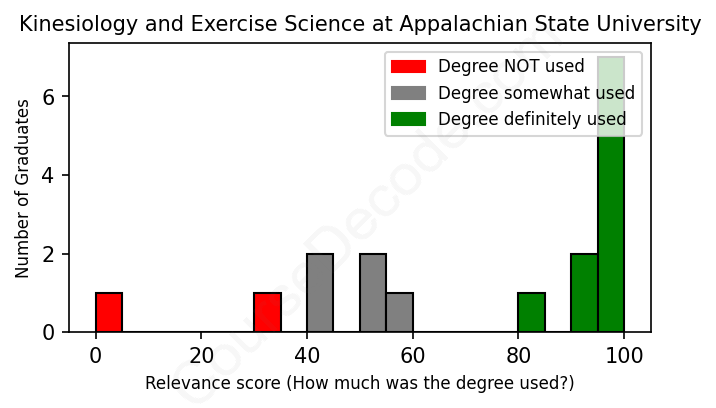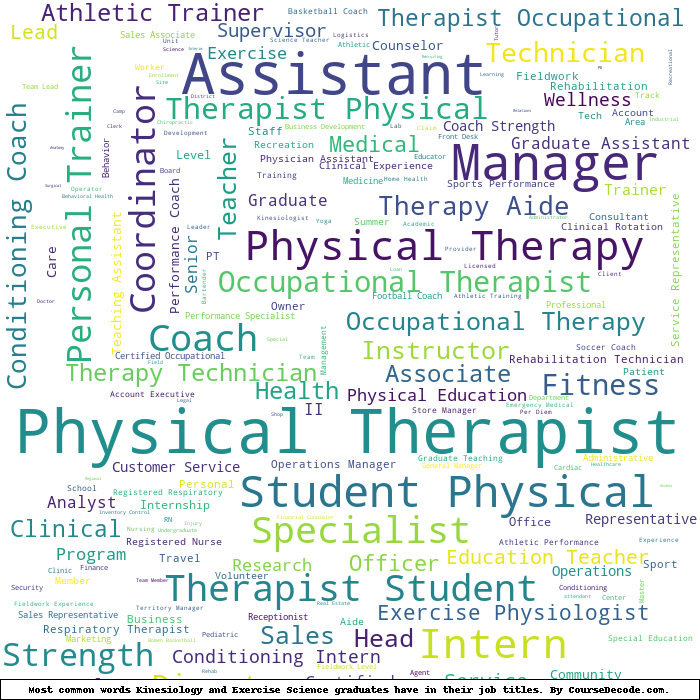
First, some facts. Of the Kinesiology and Exercise Science graduates from Appalachian State University we've analyzed , here's how many have used (or NOT used) their degree in their career:

These are estimates based on AI analysis of 17 LinkedIn profiles (see below).
The verdict? Above average. Overall, with an average relevance score of 73%, Kinesiology and Exercise Science graduates from Appalachian State University have a higher likelihood (+6%) of finding work in this field compared to the average graduate across all fields:
And for comparison, here's the chart for all profiles we've looked at across all degrees.
Also, after graduating, 64% of these graduates have pursued further education other than another Bachelor's degree (such as a Masters degree or other), compared to the average across all profiles of 35%. This suggests you may need more than just a Bachelors degree to be competitive as a Kinesiology and Exercise Science graduate.
See the details:
|
Relevance score: 50% We think this person has gone into a career only somewhat relevant to their degree. We think this person has gone into a career only somewhat relevant to their degree.
DEGREE INFOGraduated in 2021 from Appalachian State University with a Bachelor of Science - BS in Kinesiology and Exercise Science. Also pursued further education since (see below). JOB HISTORY SINCE GRADUATIONCardiovascular Technologist Assistant CaroMont Health Jan 2022 - Present FURTHER DEGREES DONE SINCE GRADUATINGAssociate of Science - ASCentral Piedmont Community College 2021 - 2023 ABOUTHello. My name is [NAME REMOVED] Caudle. I am currently a student in the invasive cardiovascular technology program at Central Piedmont Community College.Contact information: [EMAIL REMOVED] |
The top 10 most common jobs done by the graduates we've analyzed (ranked most common to least) are:
When looking at the job paths of people who studied Kinesiology and Exercise Science at Appalachian State University, it's clear that a number of them have landed roles that are directly relevant to their field, especially in sports and health-related professions. Many graduates have worked as Sports Performance Coaches and Strength and Conditioning Coaches, where they directly apply the principles learned during their degree to enhance athletic performance. Others have carved out careers in physical therapy, which closely engages with the concepts of movement and rehabilitation covered in their studies. These positions demonstrate a strong alignment with their academic background and typically allow for the hands-on application of Kinesiology and Exercise Science concepts.
However, not all graduates are utilizing their Kinesiology and Exercise Science knowledge in their jobs. Some have taken roles in education, like teaching science, which can somewhat incorporate these concepts, but doesn’t necessarily focus on them. There are also several who ended up in positions that are quite unrelated, such as in food service, administrative roles, or even owning a business. So, while many graduates have found meaningful work that relates closely to Kinesiology and Exercise Science, there’s still a fair number who are in jobs that don’t capitalize on their specialized knowledge. Overall, it’s a mixed bag—there's a strong core of relevant roles, but also a significant portion that veers away from the field entirely.
Here is a visual representation of the most common words in job titles for Kinesiology and Exercise Science graduates (this is across all Kinesiology and Exercise Science graduates we've analyzed, not just those who went to Appalachian State University):

Graduates from the Kinesiology and Exercise Science program at Appalachian State University tend to have a variety of career paths after graduation, with many of them initially taking jobs related to fitness, sports performance, or healthcare. For those who graduated a few years ago, like in 2015 or 2016, most started off in positions such as sports performance coaches, strength and conditioning coaches, or interns within athletic programs. These early roles are often stepping stones that lead to more specialized positions, like physical therapy or human performance coordination, within five to ten years. Those who moved into physical therapy roles seem to find successful and stable careers, whereas others who ventured into coaching or education have had mixed experiences, sometimes switching away from Kinesiology-related jobs entirely.
As the years go by, it appears that many graduates who stay close to their field tend to advance into more significant roles, such as clinic directors or specialized advisors, reflecting a pattern of growth in the healthcare and fitness sectors. However, there are also some graduates who have ended up in unrelated fields, like teaching or general management, which suggests that while the degree offers a solid foundation, not everyone stays within the industry. Overall, those passionate about Kinesiology and Exercise Science do tend to carve out fulfilling careers, especially if they take advantage of internships and hands-on experiences while in school. For students weighing their options, it's clear that a Kinesiology degree can lead to great opportunities in health and wellness, but there’s also a chance of diverging into other paths altogether depending on individual goals and interests.
Honestly, a Bachelor’s degree in Kinesiology and Exercise Science at Appalachian State University isn't the easiest thing out there, but it’s not the hardest either—it really falls somewhere in the middle. You’ll be diving into some pretty cool stuff about how the body moves and how exercise affects health, which can be super interesting if you’re into sports and fitness. There are definitely challenging classes, especially in anatomy and physiology, and you might need to put in some serious study time, especially if you're not a biology whiz. But if you’re passionate about the subject, it can feel more like fun than work! Just be prepared to stay on top of your assignments and really engage with the material, and you should do just fine.
Most commonly, in the LinkedIn profiles we've looked at, it takes people 4 years to finish a Bachelor degree in Kinesiology and Exercise Science.
Looking at the job histories of these Appalachian State Kinesiology and Exercise Science grads, it seems like some of them have found decent gigs, while others are still on more of a winding path towards financial stability. For example, those who went into physical therapy or became strength coaches tend to have better earning potential, especially as they climb the ladder with titles like Clinic Director or Human Performance Coordinator. But then you have some who started in roles like teaching or working as a waiter, which aren’t exactly cash cows, and they're now transitioning into more specialized roles that could pay off in the long run. Overall, it really depends on how they've navigated their careers post-graduation; some are definitely making good money now, while others are still working their way up.
Here is a visual representation of the most common words seen in the "about" section of LinkedIn profiles who have a Bachelor degree in Kinesiology and Exercise Science (this is across all Kinesiology and Exercise Science graduates we've analyzed, not just those who went to Appalachian State University). This may or may not be useful:

Here are all colleges offering a Bachelor degree in Kinesiology and Exercise Science (ordered by the average relevance score of their Kinesiology and Exercise Science graduates, best to worst) where we have analyzed at least 10 of their graduates: